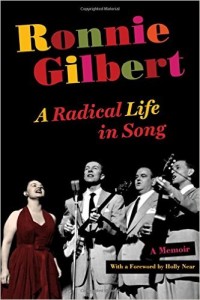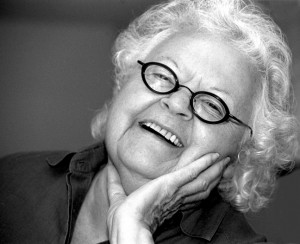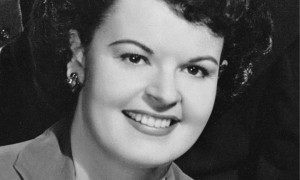 Ronnie Gilbert: A Radical Life In Song: A Memoir
Ronnie Gilbert: A Radical Life In Song: A Memoir
by Ronnie Gilbert
University of California Press
272 pages, $26.95
RONNIE GILBERT died on June 6, 2015. This posthumously published memoir offers an exceptional narrative about the life of a courageous and radical woman who believed that “songs are dangerous.”
Ruth Alice Gilbert was born in Brooklyn in 1926 to Jewish immigrant parents from Eastern Europe. Her mother was a member of the Communist Party, and Ronnie grew up with the belief that all of us must strive to make this world a better and freer place for all people. Gilbert expressed her radical ideas through the medium of music and, later in life, through musical theater. In 1948, with Pete Seeger, Lee Hays, and Fred Hellerman, she formed the singing group the Weavers, which helped launch the folk music revival with songs such as “Goodnight Irene,” “Tzena, Tzena,” “Kisses Sweeter Than Wine,” and “Wimoweh.”
But the Weaver’s popularity was short-lived, as anti-communist redbaiting became the prevailing mood of the country under the crypto-fascist leadership of Senator Joe McCarthy and the House Un-American Activities Committee (HUAC). In 1952, the Weavers were blacklisted, their record contract with Decca canceled, and access to radio airwaves and stage performances blocked. By 1955, HUAC’s witch-hunting crusade was on the wane, and the Weavers performed at Carnegie Hall in a triumphant comeback. In 1964, the group broke up, and Ronnie Gilbert needed to find another avenue for her talents.

This memoir documents Gilbert’s struggles to discover herself as an artist and as a woman. Along the way, she married, had a daughter, and divorced her husband. She struggled with the challenges of single motherhood, balancing career and child care while deploying her gifts as an artist to support them both. In due course she pursued a number of career paths, by turns a solo singer, an actor, and a psychotherapist.
Unbeknownst to Gilbert, she had become an inspiration and a role model for many younger singers in the 1970s, notably Holly Near, who dedicated her 1974 album to her. Gilbert and Near started performing together in 1983, a collaboration that resulted in the album Lifeline Extended. In 1985, they collaborated with folksingers Arlo Guthrie and Pete Seeger and recorded under the name HARP (Holly, Arlo, Ronnie, and Pete).Years later, in 1996, Gilbert and Near worked together on the album This Train Still Runs.
In time, Ronnie lent her magnificent voice to causes related to social justice and liberation: feminism, lesbian feminism, LGBT rights, same-sex marriage, and hiv/aids, as well as homelessness, racism, unemployment, and ageism. She moved with the times and continued to grow and challenge herself in every aspect of her life. Although defining herself as heterosexual for most of her adult life, in the mid-’80s she found herself falling in love with a woman, Donna Korones. Gilbert describes Donna as the love of her life. In 2004, in defiance of California’s state law, the two women were married in San Francisco when Mayor Gavin Newsom was permitting, and even officiating at, same-sex weddings.
Ronnie Gilbert bore witness to injustice through the medium of her art. Her irrepressible contralto voice belted out songs of love and freedom. She was open to life and change, challenged the status quo, and inspired others to do the same. Virginia Woolf wrote that “a self that goes on changing is a self that goes on living” (in “Defense of Letter Writing as the Humanist Art,” 1940). Ronnie Gilbert lived many selves and had one hell of a life.
Irene Javors is a psychotherapist in NYC and teaches in the Mental Health Counseling Program at Yeshiva University.







